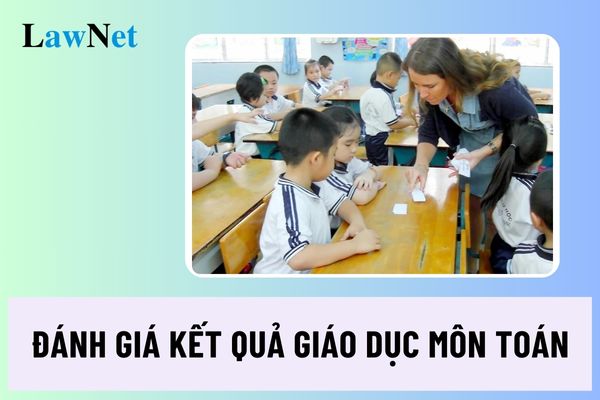Assessment of educational outcomes in Mathematics according to the new curriculum in Vietnam
What is the objective of assessing the results of Mathematics education under the new curriculum in Vietnam?
Based on Section 7 of the Mathematics Education Curriculum issued along with Circular 32/2018/TT-BGDDT, the objectives for assessing the results of mathematics education under the new curriculum are as follows:
The objective of assessing the results of mathematics education is to provide accurate, prompt, and valuable information regarding the development of students' competencies and progress, based on the required outcomes at each grade level;
At the same time, it aims to adjust teaching activities to ensure the progress of each student and improve the quality of mathematics education in particular and education in general.

Assessment of educational outcomes in Mathematics according to the new curriculum in Vietnam (Image from the Internet)
What are the methods of assessing the results of Mathematics education under the new curriculum in Vietnam?
Based on Section 7 of the Mathematics Education Curriculum issued along with Circular 32/2018/TT-BGDDT, the methods for assessing the results of mathematics education under the new curriculum are as follows:
Implementing a combination of various assessment forms (formative assessment, periodic assessment), multiple assessment methods (observation, recording the implementation process, oral examinations, objective tests, written essays, practical assignments, projects/learning products, real-world tasks,...) at appropriate times.
Formative assessment (or frequent assessment) is organized by the subject teacher, combined with assessments from teachers of other subjects, self-assessment by the student being evaluated, and peer assessment from group or class members, or assessments by parents. Formative assessment correlates with the student's learning activities, avoiding a detachment between the teaching process and the evaluation process, ensuring the goal of assessment for the progress in student learning.
Periodic assessment (or summative assessment) aims primarily to evaluate the achievement of learning goals. Periodic assessment and summative assessment results are used for certification of learning levels, recognition of student achievements. Periodic assessment is organized by the educational institution or through national examinations and evaluations.
Periodic assessment is also used for managing teaching activities, ensuring quality at the educational institution, and developing the mathematics curriculum.
Assessing student competencies through evidence of results achieved during student actions.
The evaluation process includes basic steps such as determining the evaluation purpose; identifying necessary evidence; selecting appropriate assessment methods and tools; collecting evidence; interpreting evidence and providing feedback.
Focusing on selecting methods and tools for assessing the components of mathematical competencies. Specifically:
- Assessing the competency of mathematical thinking and reasoning: can use various methods and tools such as questions (oral, written), exercises,... requiring students to present, compare, analyze, aggregate, systematize knowledge; applying mathematical knowledge to explain and reason.
- Assessing the competency of mathematical modeling: selecting realistic situations that give rise to mathematical problems.
From there, students are required to identify the mathematical model (including formulas, equations, tables, graphs,...) for the situation in the real-world problem; solving mathematical problems in the established model; displaying and evaluating the solution in the practical context and improving the model if the solution is unsuitable.
- Assessing the competency of solving mathematical problems: can use methods such as requiring learners to identify situations, detect and present the problem to be solved; describe, explain initial information, goals, desires of the problem situation being considered; collect, select, arrange information and connect with existing knowledge; use questions (requiring oral or written answers) that ask learners to apply knowledge to solve the problem, especially real-world problems;
At the same time, use observation methods (such as checklists according to defined criteria), observe learners during problem-solving; evaluate through learners' practical products (e.g., products of learning projects); reasonably pay attention to integrative assessment tasks.
- Assessing the competency of mathematical communication: can use methods such as requiring learners to listen, understand, read, write (summarize), analyze, select, extract basic and essential mathematical information from spoken or written texts; use mathematical language combined with regular language in presenting, expressing, questioning, discussing, debating mathematical content, ideas, solutions during interactions with others.
- Assessing the competency of using tools and means for learning mathematics: can use methods such as requiring learners to recognize names, functions, use specifications, ways of preserving, advantages, and limitations of tools and means for learning mathematics; present reasonable use of tools and means for learning mathematics to perform learning tasks or express mathematical reasoning and proofs.
When teachers plan lessons, they need to establish criteria and evaluation methods to ensure that at the end of each lesson, students achieve the basic requirements based on the specified criteria before proceeding to the next learning activities.
Which mathematical competencies does the subject of Mathematics in the general education program in Vietnam help students develop?
In Section 3 of the Mathematics Education Curriculum issued along with Circular 32/2018/TT-BGDDT, it is clearly stated as follows:
General Objectives
The Mathematics program helps students achieve the following primary goals:
a) Form and develop mathematical competencies, including the following core components: competency in mathematical thinking and reasoning; competency in mathematical modeling; competency in solving mathematical problems; competency in mathematical communication; competency in using tools and means for learning mathematics.
b) Contribute to forming and developing essential qualities and general competencies in students at levels suitable with the subject and grade levels as specified in the overall program.
...
According to the regulations, the goal of mathematics in the general education program is to help develop mathematical competencies with the following core components:
- Competency in mathematical thinking and reasoning;
- Competency in mathematical modeling;
- Competency in solving mathematical problems;
- Competency in mathematical communication;
- Competency in using tools and means for learning mathematics.
>> See the Mathematics Education Curriculum issued along with Circular 32/2018/TT-BGDDT:

